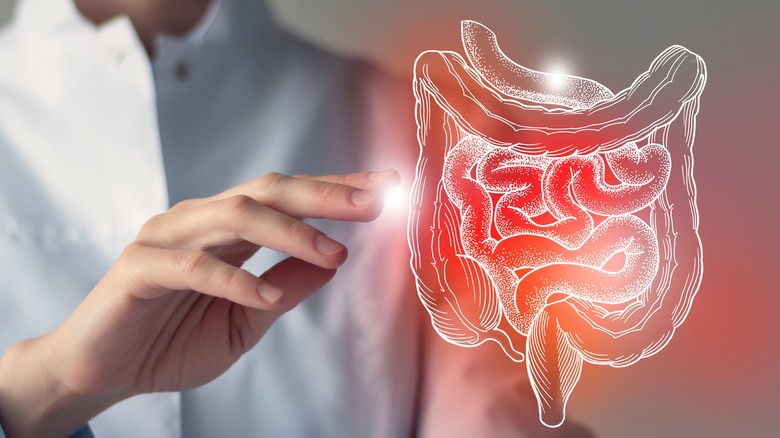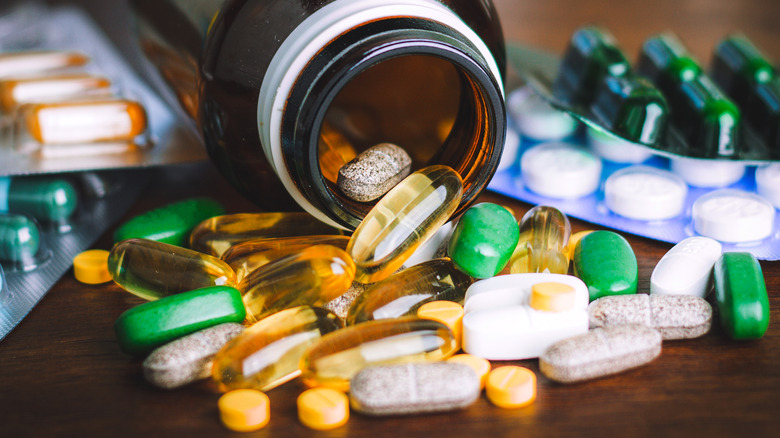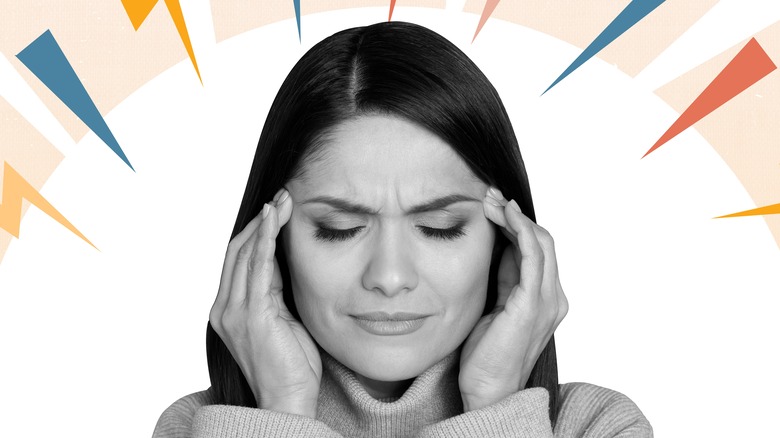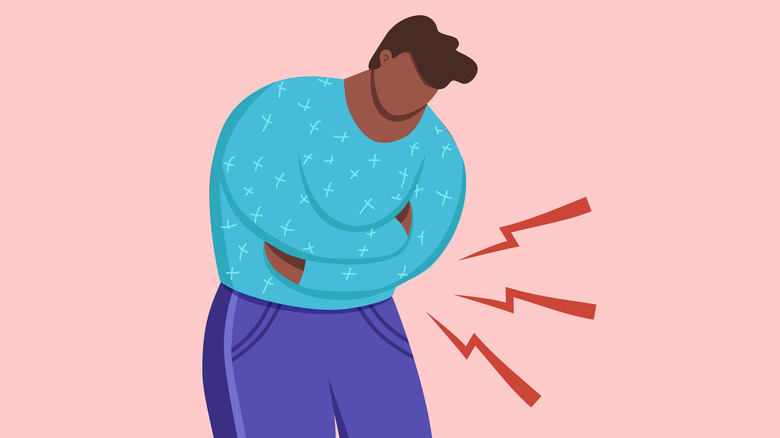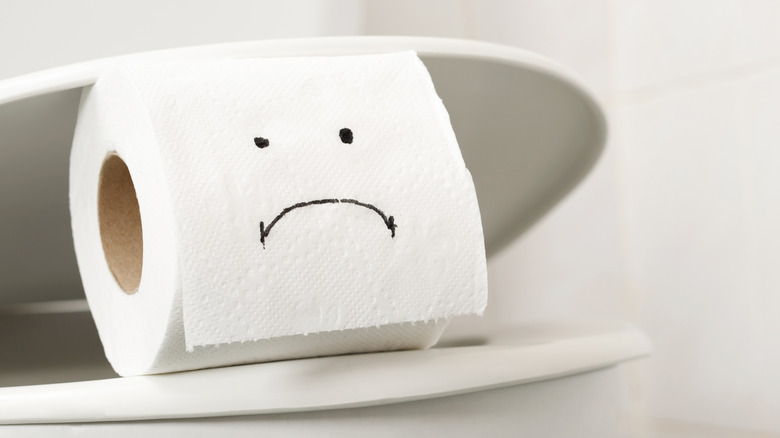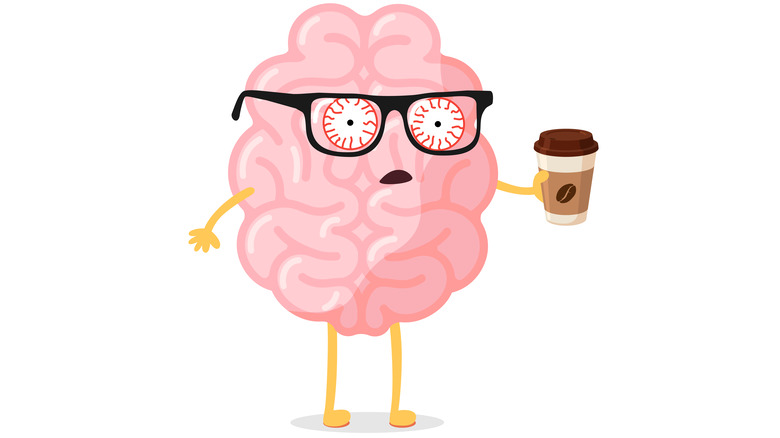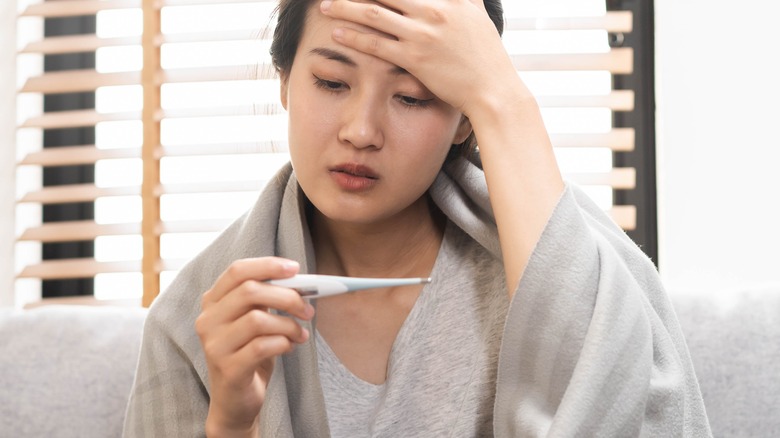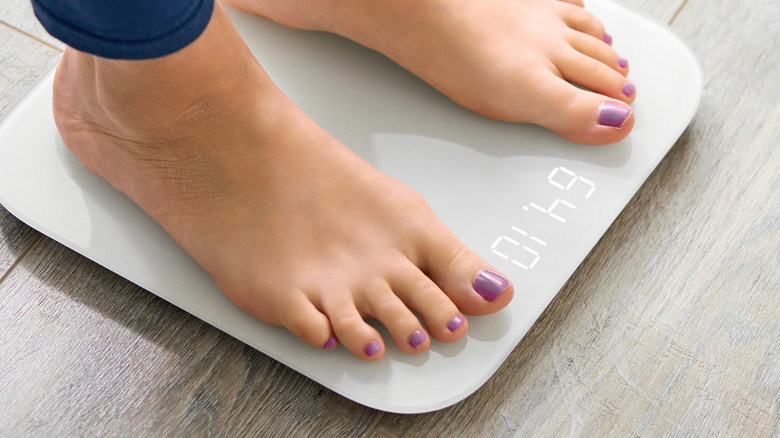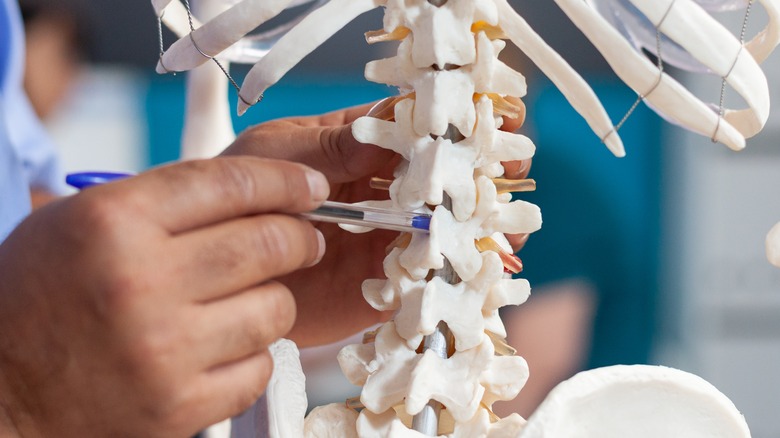How To Cope With Ulcerative Colitis Treatment Side Effects
According to Medscape, ulcerative colitis (UC) is an inflammatory bowel disease (IBD) that causes sores to appear in your large intestine. Experts at The Crohn's & Colitis Foundation explain that UC is believed to result from your immune system continuing to fight off an infection that's already been handled. Since there are no bacteria or viruses to fight, the white blood cells attack your colon, causing ulcers filled with pus. When the mucus is released, it causes inflammation, which in turn creates the need to poop more frequently.
There are three types of UC (per The Crohn's & Colitis Foundation). One kind is ulcerative proctitis, which affects a small part of your rectum. Next, left-sided colitis affects your rectum and the section of your colon directly attached to it. Finally, you get diagnosed with extensive colitis when the inflammation affects your entire colon.
Several factors increase the likelihood of you developing UC. While most cases get discovered in patients aged 15 to 30, anyone can be diagnosed at any age. However, the medical professionals at Cleveland Clinic state that your chances increase by nearly 20% if a close family member has the disease, especially if you're Jewish. Additionally, those who consume a high-fat diet or take NSAIDs like Advil or Motrin have a higher chance of developing UC.
Doctors who treat UC
The medical professionals at Cleveland Clinic recommend starting your UC journey with a trip to your regular doctor. If they believe further testing is warranted, they will examine you and send you to a gastroenterologist (GI) or a colorectal surgeon so you can undergo a colonoscopy. A gastroenterologist is a doctor that specializes in treating those with digestive problems. A colorectal surgeon performs surgeries involving the colon and rectum (per Healthgrades Marketplace, LLC).
If you're diagnosed with UC, a GI will oversee your care. However, other medical specialists will also be involved. You will also need a nutritionist to ensure that you consume foods your body can tolerate and get the nutrients it needs. If you develop skin issues, you should see a dermatologist; visit a rheumatologist for any joint problems. Also, living with a chronic condition isn't easy, so many doctors recommend seeing a psychologist to help deal with any associated depression or anxiety. Finally, nearly a third of those with UC will need surgery by a colorectal surgeon.
Experts at The Crohn's & Colitis Foundation remind you to do your homework before selecting a UC specialist. You should check to see that the doctor takes your insurance, is conveniently located with hours that fit your schedule, and has a bedside manner that works for you.
Common medications used to treat UC
The first course of action in treating UC is often amino salicylates. Also referred to as 5-ASAs, the NHS reports that these medications lower colon inflammation and allow your GI tract to heal. If 5-ASAs don't improve your symptoms, the NHS recommends adding a short-term dose of corticosteroids. Medical professionals at The Crohn's & Colitis Foundation explain that these drugs work by restraining your immune system. However, long-term use of corticosteroids can cause your body to reduce or stop making its cortisol, making it difficult for you to stop taking them without relapsing.
According to Healthline, many doctors turn to immunomodulators when 5-ASAs and corticosteroids fail to improve your situation. Also called immunosuppressants, these drugs target your body's immune response and reduce inflammation. However, though studies show they're effective, these drugs are prescribed off-label when given for the treatment of UC. Additionally, it can take several months for you to feel relief.
Medical professionals at The Crohn's & Colitis Foundation state that the next step for those with symptoms that don't respond to immunomodulators is to try biologics. Made out of organic material, these medications work by stopping the proteins responsible for inflammation. For those that other medications have failed or who need fast symptom relief, doctors prescribe Janus kinase (JAK) inhibitors, which work by blocking inflammation signals given off by your immune system (per Healthline).
Side effect: Headache
The U.S. Food and Drug Administration (FDA) reports that even though all drugs must do more good than harm, there isn't a medication on the market that doesn't have side effects. In fact, according to Family Practice Notebook, LLC., there are at least 30 substances that can cause a headache. In addition, for those with UC, Healthline reports that not only do most prescription medications list headache as a side effect, but the inflammation from the disease can also cause your head to pound.
However, before you become one of the nearly 60 million Americans who use NSAIDs, a study published by the European Journal of Clinical Pharmacology warns against UC patients doing so, as it may result in symptom relapse. While you can take Tylenol (acetaminophen) for the occasional headache, if your head hurts often, it may be time to change the dosage of your medication. Your doctor might also recommend replacing the drug with another if the symptom persists. See your doctor for a sudden severe onset, as it could indicate an unrelated issue (per Healthline).
Side effect: Stomachache
Frontline Gastroenterology reports that several medications are known to cause stomachaches because they change the makeup of what is in your stomach. If you take medication in pill form, the coating can also cause you pain. Moreover, a study published by Inflammatory Bowel Diseases shows that several drugs work as IBD triggers and may actually cause the disease.
Per SingleCare, 5-ASAs, immunosuppressants, and biologics can cause abdominal pain in UC patients. Additionally, studies show that over 30% of those diagnosed with UC reported that they continued to have abdominal pain while in remission (via the Cochrane Library). Aside from being attributed to medication, the pain may also result from the psychological ramifications of the disease.
Diet change, therapy, exercise, and medication can relieve the pain. However, medical professionals associated with Therapeutic Advances in Gastroenterology warn against using long-term pain‐relieving drugs such as antispasmodics, analgesics, and narcotics due to potentially adverse effects.
Side effect: Diarrhea
MedlinePlus reports that few drugs don't list diarrhea as a side effect. However, some medications are more likely than others to cause you to run to the bathroom, including laxatives, antacids, and antibiotics (per the IBD Help Center).
According to MedicalNewsToday, some doctors may prescribe antibiotics to patients with diseases that are bacterial in nature. However, the use of antibiotics may cause a UC patient to experience "a flare-up of symptoms," one of which is diarrhea. Thus, it is highly advised that a patient inform their physician if they have UC prior to implementing their treatment regimen for a different illness, especially if the prescription includes antibiotics.
Medical professionals at Icahn School of Medicine at Mount Sinai recommend you speak to your doctor about ways to control your diarrhea. Some suggestions include medications, eating smaller meals more often, drinking more water, and avoiding high-fat and high-fiber foods. Stress management also helps.
Side effect: Rash
Per the Pharmacy Times, people report rashes more than any other medication side effect. According to the IBD Resource Center, almost 20% of those diagnosed with IBD see their doctor about a related rash. While patients can blame the disease for some, others are caused by the drugs used to treat the condition.
For one thing, the IBD Resource Center reports that some patients are allergic to sulfa and therefore react to the antibiotic Sulfasalazine, resulting in a rash. Additionally, those that use anti-TNF agents often end up with a rash that looks like psoriasis. However, nearly 90% of those who got a rash from an anti-TNF agent could continue using the medication. Furthermore, almost a quarter of patients didn't require any treatment, and half showed improvement when prescribed a skin cream (per the American College of Physicians).
However, according to Merck Manual, determining which drug is responsible could be difficult, as the rash could occur months after use. Therefore, if allergy testing or skin biopsy fails to render results, you may have to stop each drug you take and restart each one separately until the culprit is found. See your doctor for either a topical remedy or oral medication, including steroids, to help get rid of the rash and any discomfort that comes with it (via IBD Resource Center).
Side effect: Insomnia
The Brazilian Sleep Association reports that drugs like corticosteroids work on your central nervous system and can cause insomnia and other sleep issues. According to the AARP, while reducing inflammation, these medications cause your adrenal glands to work overtime, affecting your sleep-wake cycle and resulting in insomnia. Additionally, antidepressants (SSRIs) that some doctors prescribe to UC patients for anxiety and depression can also cause insomnia.
A study in Crohn's & Colitis 360 reports that three-quarters of those with IBD have issues falling and staying asleep, attributed to both the disease and the side effects of the prescribed medications. Furthermore, the Journal of Crohn's and Colitis reports that those with these disorders get under five hours of sleep nightly.
Based on a recommendation by the American College of Physicians, the medical professionals associated with the study published in Crohn's & Colitis 360 recommend Cognitive Behavioral Therapy for Insomnia (CBT-I) to help those with UC sleep better. According to the Sleep Foundation, CBT-I involves changing how you think and approach sleep, reducing anxiety and distractions. Additionally, you learn relaxation techniques and how to keep a consistent sleep schedule without daytime naps.
Furthermore, a Digestive Diseases and Sciences study shows that switching to biologics also helps improve sleep. The International Journal of Molecular Medicine reports that melatonin reduces inflammation in the GI tract, enabling patients to sleep better.
Side effect: Dry mouth
In addition to lubricating and cleaning your mouth, your body also produces saliva to help you eat and talk while protecting your mouth from tooth decay, bacteria, and viruses. The American Academy of Oral Medicine reports that over 1,100 prescription and over-the-counter medications cause dry mouth, including antidepressants, antidiarrheals, and opioids that patients with UC take. Moreover, SingleCare says that over 10 million Americans have medication-related dry mouth resulting in bad breath, tooth decay, gum disease, and mouth sores. A study referenced by MedicalNewsToday found that those with UC were three times more likely to have dry mouth than those without the disease.
SingleCare recommends chewing sugar-free gum and drinking enough water to remain hydrated to reduce dry mouth. You could also try using a humidifier, reducing caffeine intake, and using mouthwash. Furthermore, several over-the-counter and prescription medications promote saliva production or replace mouth liquid. The National Institute of Dental and Craniofacial Research also recommends avoiding spicy and salty foods, as well as tobacco and alcohol.
If your dry mouth fails to improve, speak to your doctor about a change in medication (per MedicalNewsToday).
Side effect: Fever
Several medications, including some antibiotics prescribed to those with UC, cause fevers. The Annals of Pharmacotherapy reports that the elevation in body temperature results from several factors, including increased metabolism, an immune system response, or hypersensitivity. However, the fever often doesn't manifest until a week or more after starting the drug. Drug-induced fevers usually dissipate when the medication is stopped, start back up if you begin retaking it, and stay as long as you take the prescription. Your doctor should take you off the suspected drug for three or four days. While you become more susceptible to drug-induced fevers as the number of medications you take increases, it's essential to stop taking them, one at a time (per VisualDx).
According to a paper published in Clinical Gastroenterology And Hepatology, more than 10% of UC patients reported having either a fever or night sweats within a three-month time span. While fever is a prominent symptom of UC, MedicalNewsToday states that it is important to see your doctor to rule out complications, including severe colitis, fulminant colitis, and toxic megacolon.
How your doctor treats your fever depends on the cause. However, physicians often start by prescribing 5-ASAs and immunosuppressants. IV-administered corticosteroids and antibiotics also help reduce fever in those with UC.
Side effect: Fatigue
Unlike insomnia, rest doesn't cure the lack of energy associated with fatigue (per Journal of Pain and Symptom Management). According to Harvard Health Publishing, several groups of medications cause patients to feel tired, including antihistamines, antipsychotics, and anticonvulsants, as well as alpha and beta blockers. Additionally, some medications prescribed to those with UC (including antidepressants, over-the-counter and prescription drugs used to treat nausea and vomiting, muscle relaxants, and opioids) also zap energy.
Moreover, The American College of Gastroenterology reports that using steroids for an extended period could cause fatigue, as does coming off of them too quickly. If you believe that steroid use contributes to your exhaustion, take it first thing in the morning. For those with UC, fatigue can also result from your body's response to chronic inflammation, insomnia, anemia, and other nutritional deficiencies brought on by the disease (via Crohn's & Colitis Foundation).
The medical professionals at Advances in Therapy recommend that you speak with your doctor, especially if your fatigue occurs while you're in remission.
Side effect: Weight gain
A study published in Obesity shows that nearly 20% of Americans take a prescription medication that can cause them to gain weight. Additionally, the University of Rochester Medical Center reports that six types of drugs are known to cause patients to pack on the pounds, including steroids and antidepressants prescribed to those with UC. Overall, drug-related weight gain results from several factors, including appetite stimulation, changes in metabolism, water retention, and fatigue that prevents you from exercising.
Though it may seem as if the digestive issues related to UC would cause you to lose weight, the opposite is true for some patients. In addition to medication side effects, MedicalNewsToday attributes weight increase to difficulty consuming certain foods and trouble exercising due to pain and discomfort from the disease.
According to an article published in Nutrients, a healthy diet is one in which you eat just enough carbohydrates, proteins, and fats to provide the energy you need, along with the vitamins and minerals your body needs for physiologic functioning. Since those with UC often avoid high-fiber foods (resulting in an unhealthy diet), MedicalNewsToday recommends eating smaller meals more frequently. You should also walk for exercise, maintain portion control, and ensure proper calorie consumption by using a food diary.
Side effect: Mood swings
Health Navigator reports that ten different types of medications can affect your mood, three of which (steroids, opioids, and antidepressants) are commonly prescribed to those with UC. However, it's often difficult for your doctor to determine whether your mood swings are due to your medication or the ailment they're meant to treat. This is especially true for those with UC, as there is no cure for the disease, and you never know how it will affect you daily (via Healthline).
Furthermore, a study published in The Lancet Gastroenterology & Hepatology found that over 30% of those diagnosed with IBD showed signs of anxiety, and a similar number had symptoms of depression. The number increased to nearly half in those not in remission. Moreover, medical professionals associated with Clinical and Experimental Gastroenterology refer to a study that shows UC patients often display symptoms of depression before a relapse, and others that indicate that anxiety and depression contribute to UC flares.
If your moods are concerning, Health Navigator recommends that you speak to your doctor about changing doses or medications. However, it's essential not to stop any medicine without talking to a physician, as that can worsen UC symptoms and mood swings. Some physicians also recommend seeing a therapist, learning relaxation techniques, and joining a support group to control your feelings (per Crohn's & Colitis Foundation).
Side effect: Infection
According to the CDC, two kinds of medication commonly prescribed for UC, corticosteroids and TNF inhibitors, increase your risk of developing a fungal infection. Though fungal infections mimic bacterial and viral infections, they require different treatments. Additionally, Pharmacology & Therapeutics reports that doctors prescribe oral corticosteroids over 10 million times annually in the United States. Furthermore, Healthline states that your risk of infection increases every time your doctor increases the strength of your dosage. In fact, if you take more than 25 milligrams daily, your risk of infection is tripled for nearly a year after completing the course of medication.
Biologics, another medication prescribed for UC, suppresses your immune system and limits your body's ability to naturally fight off infections (per Johns Hopkins Arthritis Center). A study in the Journal of Advanced Research found that those taking biologics increase their chances of developing an infection by over 50%, with most patients presenting with respiratory infections.
The CDC recommends avoiding dust and bird droppings, and wearing gloves and protective clothing while gardening to reduce your risk of developing a fungal infection. Additionally, Healthline advises seeing your doctor if you have a flare-up while in remission, especially if it involves a high fever, bloody diarrhea, and pain. Finally, never stop taking your medication without speaking to a healthcare professional.
Side effect: Risk of osteoporosis
According to the IBD Help Center, up to 60% of those with UC have decreased bone density, with those that take long-term corticosteroids showing similar statistics. However, few symptoms appear until breakage occurs. At that point, hip fractures result in nearly half of patients dying or being confined to a nursing facility within a year (via the World Journal of Gastroenterology). Another common injury is vertebral fractures, which often result in disability. Furthermore, the more bones you break, the more likely you are to break a bone and become disabled.
Long-term corticosteroid use interferes with your bones' ability to absorb calcium, reduces the amount of bone-forming cells your body produces, and increases the creation of cells that break down your bones (per IBD Help Center). Additionally, these medications also lower the amount of estrogen your body generates. These effects all occur while the inflammation that results from the disease causes your body to form chemicals, known as cytokines, that interfere with bone metabolism.
However, Dr. Miguel Regueiro, Chair of the Digestive Disease & Surgery Institute at Cleveland Clinic, shares that in a study conducted by him and his colleagues, those who took biologics for UC were "significantly less likely" to develop osteoporosis. The researchers attribute this to the medications lowering your body's production of cytokines.
In addition to asking your doctor about switching medications, the IBD Help Center recommends increasing the amount of exercise you get, as well as your calcium and vitamin D intake.

